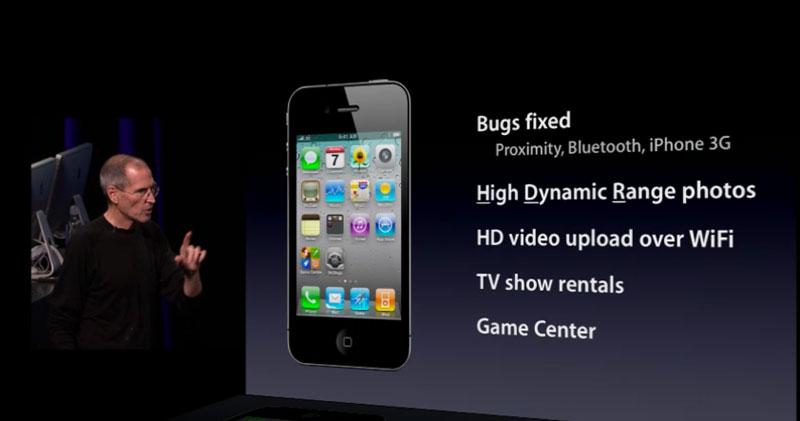In discussing the possibility of adding a theft resistant "kill switch" to future iPhone models, Apple's government liaison has noted that the next two generations of iPhone have already been developed, and were designed before Steve Jobs' death.
Seeking to stem the tide of smartphone thefts, San Francisco's District Attorney George Gascón has met carriers and device makers, including Apple, whose iPhones account for half of the devices pilfered in the City. The depth of Apple's product pipeline surfaced during those talks.
I'm from the government and I'm here to help you
According to a report by Mike Aldax of the SF Examiner, Gascón was left "disheartened" by a meeting with mobile carriers, and hoped that subsequent discussions with Apple would "reveal a commitment toward solutions."
Instead, Gascón said the meeting with Apple’s government liaison Michael Foulkes was "very underwhelming," and added, "he did most of the talking. It was incredible. He would just go on and on, one subject to the next. It was hard to follow. It was almost like someone who’s been trained in the art of doing a lot of talking and saying nothing."
Foulkes discussed the research and development behind creating and deploying a "kill switch" system to arrest phone theft, but "also said the next two generations of iPhones have already been developed," according the report.
Gascón further commented that the next two iPhone models in the pipeline "preceded Tim Cook."
Jobs passed away the day before Apple unveiled iPhone 4S in late 2011. That indicates Jobs had known about the design of next three generations of iPhones following it.
No deliverables for DA voters obtained
While the DA indicated he didn't expect Apple to change the design of the next iPhone based on the discussion held last week, he was hoping for a "plan in place," given that he believes that the technology is possible. He further speculated that Apple isn't too concerned about thefts because "there's just too much being made on stolen phones."
No carrier or phone maker has made any significant efforts to deploy a fool-proof antitheft device for smartphones, although the industry collectively came up with a national registry in the U.S. that allows victims of theft to enter their device's mobile serial number. Carriers can consult the registry and voluntarily block activation of phones reported as stolen.
The registry is limited by the fact that not all carriers participate, and that many stolen devices are shipped overseas. Adding any sort of kill switch would likely result in lots of new, unanticipated issues for carriers and phone makers.
Any kill switch system that could be "unlocked" could conceivably also be unlocked by sophisticated thieves (according to the arguments against DRM, which say that all locks are ineffective). Any permanently disabling system could be invoked by mistaken users or malicious agents who figure out how to remotely disable anyone's phone using nothing more than their ID number and a false theft report.
Apple has deployed "Find My iPhone" features that enable users to track stolen devices, but these rely on the ignorance of thieves, who can easily disable the tracking system or simply turn off the device. Some have suggested that Apple could at least try to demand a security passcode to power off or disable the tracking of a user's iOS device.
Embarrassing to the Cook bashers
While San Francisco's DA didn't solve the case of the missing iPhone, his revelation of the size of Apple's product pipeline does demolish the accusations of analysts and other observers who have been trying to establish that Apple suddenly went rudderless and blind the day it lost Jobs as its cofounder and former chief executive.
Over the past two years, critics have cited the iPhone 4S and iPhone 5 as evidence that Cook's Apple is wildly different and woefully incapable of remaining as successful as the company had been under Jobs, despite two years of financial reports and sales records that refute that flawgic.
The fact that Apple still has another two iPhone generations that were developed under Jobs also indicates that the charismatic executive had also witnessed and approved of the development of other things in Apple's roadmap that have been recently released, including last summer's MacBook Pro with Retina Display and the newly redesigned Mac Pro that Cook has said the company will release this year.
 Daniel Eran Dilger
Daniel Eran Dilger







-m.jpg)






 Charles Martin
Charles Martin
 Christine McKee
Christine McKee
 Wesley Hilliard
Wesley Hilliard
 Malcolm Owen
Malcolm Owen
 Andrew Orr
Andrew Orr
 William Gallagher
William Gallagher
 Sponsored Content
Sponsored Content







61 Comments
Wonderful. Two more years of idiots screaming "RIDING ON THE COATTAILS!"
Precautionary statements for Next Release of iPhones. If something goes wrong... no one points Jony but Steve. A safety measure.
Wonderful. Two more years of idiots screaming "RIDING ON THE COATTAILS!"
While at the same time complaining that Apple is devoid of innovation or new ideas since Steve is gone. Personally I think this is a bunch of BS. Steve may have signed off on stuff but that doesn't mean they're etched In stone and can never be changed. For instance we have no idea if Steve signed off on the mini or not. All we have was that leaked email from Eddy Cue saying Steve was receptive to the idea.
why don't they just come out with needing to type a password in order to shut the phone off? wouldn't that prevent all iphones from being stolen if the thieves don't know the password to shut the phone down? (and thus the phone is always traceable).
Really, coming from someone in government? "It was almost like someone who's been trained in the art of doing a lot of talking and saying nothing."